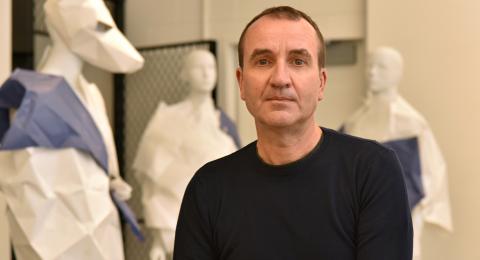Fulbright awarded to art professor 'pushing boundaries' in contemporary drawing
Office of Communications and Marketing
Published
SUNY Oswego art professor Juan Perdiguero will spend four months in Chile next spring as a Fulbright U.S. Scholar, teaching and doing research on techniques and processes in drawing that cut across traditional, single-discipline boundaries.
The Fulbright Commission accepted Perdiguero's application to work from March 1 to June 30, 2019, as a visiting professor at Finis Terrae University School of Visual Arts in Santiago, Chile.
"I was very excited to learn of this, because I know this is a very competitive grant," said Perdiguero, trained classically in drawing in Madrid and noted for experimenting across painting, printmaking, photography and digital imaging.
The Fulbright U.S. Scholar Program offers about 470 grants a year for its prestigious academic exchange program. Scholars in the fine arts, who are expected to collaborate with colleagues in such countries as Chile, compete with those throughout the humanities from across the United States for a subset of those awards.
Perdiguero's efforts and those of his students at Finis Terrae next spring stand to benefit, as do other students and art faculty in Latin America, Europe and the United States, including SUNY Oswego.
"As we transition into the 21st century, art practices promote interdisciplinary ways of creating," the professor wrote in his Fulbright application. "Art schools and university studio art programs, in the U.S. and abroad, have been implementing novel curricula based upon these concepts to prepare young artists to adapt to this evolving new reality."
Cultural exchange
Perdiguero expects that besides helping develop the interdisciplinary art curriculum at Finis Terrae, he will use what he learns there to inform his teaching at Oswego and his workshops around the world, most recently in Beijing.
"I want to experiment as I teach" at Finis Terrae, he said. "It's like going into a lab as a team with a scientist."
A dual citizen of the U.S. and of Spain, Perdiguero said he looks forward to taking further his strong connection with Latin American culture. In preparation for his Fulbright in Chile, he intends to travel in early 2019 to Madrid, where he is in a doctoral program at Madrid Complutense University School of Fine Arts.
Additionally, Perdiguero has a very active art career, recently completing a show titled "Animalario" at SUNY Oswego's Tyler Art Gallery. He has exhibited his work extensively in the United States and Europe for nearly three decades after his "rigid and restrictive" training in classical drawing techniques in Spain, he said.
"I am always excited about pushing boundaries," he said.
Perdiguero has worked with Chilean artist Mariana Najmanovich, who in 2012 exhibited her paintings and mixed media at SUNY Oswego. She worked at Finis Terrae University, which has since supported Perdiguero's Fulbright application.
The Fulbright scholar hopes to mount exhibitions of Chilean students' work at both Finis Terrae and SUNY Oswego; in the future, there could be an exhibition of Oswego students' artwork in Chile, he said.
The Fulbright Program provides participants -- chosen for their academic merit and leadership potential -- with the opportunity to study, teach and conduct research, exchange ideas and contribute to finding solutions to shared international concerns. It seeks to improve intercultural relations, cultural diplomacy and intercultural competence between the people of the United States and other countries.
The Fulbright Program is the flagship international educational exchange program sponsored by the U.S. government. The program is funded through an annual appropriation made by Congress to the U.S. Department of State's Bureau of Educational and Cultural Affairs. Participating governments and host institutions, corporations and foundations around the world also provide direct and indirect support to the program, which operates in more than 160 countries worldwide.



